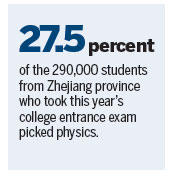Students steer clear of physics in gaokao
China Daily | Updated: 2017-09-20 07:11
Over the past few days, Fang Zhong, head of the Chinese Academy of Sciences' Institute of Physics, has become something of an online celebrity.
"I hope you choose physics, and fall in love with it," Fang told freshmen at a Beijing high school in August.
The remark was a response to a worrying decline in the love for physics among senior high school students. Among the 290,000 students from Zhejiang province who took this year's gaokao - the annual college entrance exam - only 80,000, or 27.5 percent, picked physics as a prime area of interest. In Shanghai, it was 30 percent. The test is geared toward the subjects a student selects.

Criticized for forcing students to choose between science and liberal arts - requiring them to choose one path or the other - Shanghai and Zhejiang province have been running a revised system. Students can choose any three of six subjects listed, along with compulsory Chinese, math and English. But students consider physics to be difficult and don't want to risk their gaokao score, so they tend not to pick it.
"Students who are good at science but weak in physics tended to replace it with a humanities subject," said a physics teacher surnamed Hou in Zhejiang. "Those subjects are seen as safer."
The situation has raised concerns, especially among educators.
"Physics is the basis for many other natural sciences," said Li Yuwei, a physics teacher at the high school affiliated with Beijing Normal University. "Those with a physics background who transfer to other majors are more likely to succeed."
Xiong Bingqi, vice-president of the 21st Century Education Research Institute, said that students and their parents need to think about quality and personality, not just blindly pursue higher marks.
"As long as that doesn't change, the new gaokao will be no different from the old gaokao," he said.
The Ministry of Education has set new standards on science in primary schools that took effect this semester. The standards stress inspiring children's curiosity and desire for knowledge, while regulating teaching methods.
"Younger kids are very curious about a lot of things, making it easier to get them interested," said Liu Ying, a doctoral supervisor at Peking University.
Still, Xiong Bingqi wants more to be done. He thinks colleges should separate exam results from enrollment.
"Only then can we make science education an inspiration," he said.
Xinhua
























